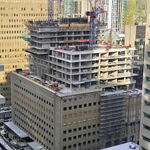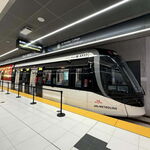Steve X
Senior Member
Everyone squeezing through at Yonge is the worst.I'm dying for this to wrap up - Adelaide being down to one lane past York has been an absolute nightmare...
Everyone squeezing through at Yonge is the worst.I'm dying for this to wrap up - Adelaide being down to one lane past York has been an absolute nightmare...
The switches are not the problem causing the cars to go slowly through the intersections.With this track replacement, are they installing different switches at the intersections so the streetcars don't have to drive slow through an intersection?
It’s TTC procedures, correct?The switches are not the problem causing the cars to go slowly through the intersections.
Dan
There are a number of different rules that govern how cars operate through intersections, and those are the culprit, yes.It’s TTC procedures, correct?
Can you explain why TTC rules seem to differ from those in other cities where streetcars do not seem to need to crawl through intersections (and can pass on corners)? With poles I could see that going too fast at turns or junctions might cause the pole to 'de-wire' but that is surely not a pan problem so the difficult seems to be the rails/switches or ???There are a number of different rules that govern how cars operate through intersections, and those are the culprit, yes.
Dan
As is the case with so many other things, the rules that the TTC has instituted over the years have been as a result of various incidents. The colloquialism "each rule is written in blood" could apply, although thankfully there were no major injuries or deaths.Can you explain why TTC rules seem to differ from those in other cities where streetcars do not seem to need to crawl through intersections (and can pass on corners)? With poles I could see that going too fast at turns or junctions might cause the pole to 'de-wire' but that is surely not a pan problem so the difficult seems to be the rails/switches or ???
The two most famous rules - the stop-and-stay, and 10km/h over specialwork - are a result of accidents at intersections about 20+ years ago. But the switches were not the cause at either of them - rather operator speeding was. In both cases, cars approached switches set to diverging at speeds far faster than the system could reset them. It wouldn't matter what the switch hardware was in either case.
Dan
Nothing that I've seen of late leads me to hold out much hope management-wise. Everything is knee-jerk and reactive - and has been for a long time. The finger pointing needs to stop. Rather than divisions and sections trying their damnedest to avoid being pitted with the blame, everyone should be working together to try and get down to the bottom of the problem, and work together to not only find a solution, but to also find a way to prevent it from happening again.Dan, other than having the TTC simply 'ease up'. Do you see any good alternative management strategies to allow greater speed, but not 'dangerous' speed in such cases?
What's so frustrating is that, based on your recent posts, not only does there appear to be no effort from the TTC to address the multiple issues surrounding the streetcars, they're also spending hundred of millions ordering more of them. Money that probably would have been better spent on upkeeping the Subway network.Nothing that I've seen of late leads me to hold out much hope management-wise. Everything is knee-jerk and reactive - and has been for a long time. The finger pointing needs to stop. Rather than divisions and sections trying their damnedest to avoid being pitted with the blame, everyone should be working together to try and get down to the bottom of the problem, and work together to not only find a solution, but to also find a way to prevent it from happening again.
That's hard enough to try and do all that in my organization of 25 employees. I can't fathom the effort required in one of 14,000.
The biggest issue was, is, and will be for quite some time (it seems), the "NA" switch activation system. In theory, once it gets replaced a number of the restrictions around operating through specialwork can be lifted.
But will they? I have my doubts.
Dan
Perhaps part of the issue is what is perceived as a "problem".What's so frustrating is that, based on your recent posts, not only does there appear to be no effort from the TTC to address the multiple issues surrounding the streetcars, they're also spending hundred of millions ordering more of them. Money that probably would have been better spent on upkeeping the Subway network.
Shiny new streetcars, riding on new tracks on Adelaide, yet same crap, slow service. I love it!
The old saying "There's none so blind as those who will not see" comes to mind! Anyone paying even minimal attention to transit users or transit blogs knows that the route management of the surface network is shameful. Steve Munro publishes excellent (and exhaustive/exhausting!) reports that show clearly that the problem is not (mainly) "too much traffic'.But do they think that there is a problem with the way the streetcars are run? Do they hear the complaints on here that they operate too slowly? It doesn't seem like it. And maybe that's the problem - it needs to be brought to their attention.
Dan
Oh, I completely agree on all counts. And my understanding is that at least some of the higher-ups at the TTC know about them. And honestly, the TTC has enough data points at their own disposal - and commentary from those closer to the ground - that they should be able to arrive at those same conclusions.The old saying "There's none so blind as those who will not see" comes to mind! Anyone paying even minimal attention to transit users or transit blogs knows that the route management of the surface network is shameful. Steve Munro publishes excellent (and exhaustive/exhausting!) reports that show clearly that the problem is not (mainly) "too much traffic'.




